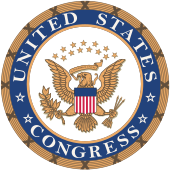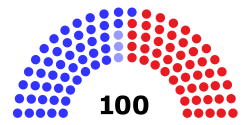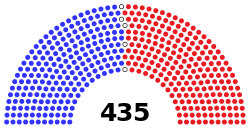United States Congress
United States Congress | |
|---|---|
| 118th United States Congress | |
 | |
| Type | |
| Type | |
| Houses | Senate House of Representatives |
| History | |
| Founded | March 4, 1789 |
| Preceded by | Congress of the Confederation |
New session started | January 3, 2023 |
| Leadership | |
| Structure | |
| Seats |
|
 | |
Senatepolitical groups | Majority (51)
Minority (49)
|
 | |
House of Representativespolitical groups | Majority (221)
Minority (212)
|
| Elections | |
Senatelast election | November 8, 2022 |
House of Representativeslast election | November 8, 2022 |
Senatenext election | November 5, 2024 |
House of Representativesnext election | November 5, 2024 |
| Meeting place | |
 | |
| United States Capitol Washington, D.C.,United States | |
| Website | |
| www | |
TheUnited States Congressis thelegislative,or law making, branch of theUnited Statesgovernment. It meets in theUnited States Capitol.[3]
It has two houses (parts): TheUnited States House of Representativesand theUnited States Senate.This two house system is known as abicameral(biis theLatinword for "two", andcamerais Latin for "chamber" or "room" ) legislature. There are 435 Representatives in Congress,[4]split between the states based on how many people live in the state.[5]There are 100 Senators in Congress, with two coming from each state.[6][7]
The primary duty of Congress is to write, debate, and passbills(laws they want). For Congress to pass a bill, both houses must pass exactly the same bill. For each house to pass a bill, more than half of its members must vote in favor of passing the bill. After both houses pass the same bill, this bill is then sent to thePresident.If the President agrees the bill should be a law he or she signs the bill within 10 days. If the president does not agree, then he or she canvetothe bill and send it back to Congress. If the bill is neither signed nor vetoed by the president within 10 days, the bill becomes law anyway if Congress does not adjourn (end its session) within that time. If Congress adjourns within that time, the bill does not become a law. Congress mayoverridea president's veto of a bill by having more than two thirds of its members passing the bill. In that case, the bill becomes law even though the president vetoed it.
Article 1 of theUnited States Constitutionlists what subjects Congress can pass laws on.
Members of Congress cannot bearrested,except for certain crimes, during a session of Congress or going to or returning from a session.
Each house of Congress can decide to expel (throw out) one of its members if more than two thirds of them vote to expel him or her.
Thepolitical partywith the most members in a house of Congress usually decides which bills are voted on in their house.
Related page
[change|change source]References
[change|change source]- ↑"Maine Independent Angus King To Caucus With Senate Democrats".Politico.November 14, 2012.Archivedfrom the original on December 8, 2020.RetrievedNovember 28,2020.
Angus King of Maine, who cruised to victory last week running as an independent, said Wednesday that he will caucus with Senate Democrats. [...] The Senate's other independent, Bernie Sanders of Vermont, also caucuses with the Democrats.
- ↑Sinema, Kyrsten."Sen. Kyrsten Sinema: Why I'm registering as an independent".The Arizona Republic.Archivedfrom the original on December 9, 2022.Retrieved9 December2022.
- ↑"U.S. Capitol Visitor Center".U.S. Capitol Visitor Center.
- ↑See Public Law 62-5 of 1911, though Congress may change the number of Representatives.
- ↑United States ConstitutionArticle I, Section 2.
- ↑United States Constitution Article I, Section 3.
- ↑United States ConstitutionAmendment XVII.
- ↑Theindependentsenators,Angus KingofMaine,Bernie SandersofVermont,andKyrsten SinemaofArizona,caucuswith the Democrats.[1][2]
